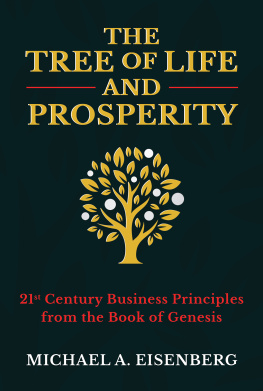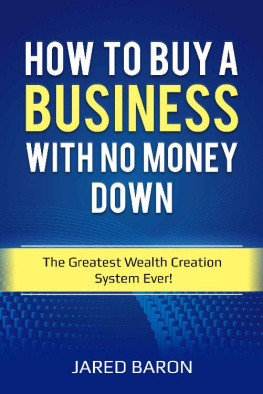Copyright 2012 by Ziad A. Abdelnour. All rights reserved.
Published by John Wiley & Sons, Inc., Hoboken, New Jersey.
Published simultaneously in Canada.
No part of this publication may be reproduced, stored in a retrieval system, or transmitted in any form or by any means, electronic, mechanical, photocopying, recording, scanning, or otherwise, except as permitted under Section 107 or 108 of the 1976 United States Copyright Act, without either the prior written permission of the Publisher, or authorization through payment of the appropriate per-copy fee to the Copyright Clearance Center, Inc., 222 Rosewood Drive, Danvers, MA 01923, (978) 750-8400, fax (978) 646-8600, or on the Web at www.copyright.com. Requests to the Publisher for permission should be addressed to the Permissions Department, John Wiley & Sons, Inc., 111 River Street, Hoboken, NJ 07030, (201) 748-6011, fax (201) 748-6008, or online at http://www.wiley.com/go/permissions.
Limit of Liability/Disclaimer of Warranty: While the publisher and author have used their best efforts in preparing this book, they make no representations or warranties with respect to the accuracy or completeness of the contents of this book and specifically disclaim any implied warranties of merchantability or fitness for a particular purpose. No warranty may be created or extended by sales representatives or written sales materials. The advice and strategies contained herein may not be suitable for your situation. You should consult with a professional where appropriate. Neither the publisher nor author shall be liable for any loss of profit or any other commercial damages, including but not limited to special, incidental, consequential, or other damages.
For general information on our other products and services or for technical support, please contact our Customer Care Department within the United States at (800) 762-2974, outside the United States at (317) 572-3993 or fax (317) 572-4002.
Wiley also publishes its books in a variety of electronic formats. Some content that appears in print may not be available in electronic books. For more information about Wiley products, visit our web site at www.wiley.com.
Library of Congress Cataloging-in-Publication Data:
Abdelnour, Ziad.
Economic warfare : secrets of wealth creation in the age of welfare politics / Ziad K. Abdelnour with Wesley A. Whittaker. 1
p. cm.
Includes index.
ISBN 978-1-118-15012-2 (cloth); ISBN 978-1-118-19765-3 (ebk); ISBN 978-1-118-197646 (ebk); ISBN 978-1-118-197639 (ebk)
1. InvestmentsUnited States. 2. Global Financial Crisis, 20082009. 3. WealthUnited States. 4. United StatesEconomic policy. I. Whittaker, Wesley A. II. Title.
HG4910.A615 2011
330.973dc23
2011032044
A return to first principles in a republic is sometimes caused by the simple virtues of one man. His good example has such an influence that the good men strive to imitate him, and the wicked are ashamed to lead a life so contrary to his example.
Niccolo Machiavelli (14691527)
This book is dedicated to Nadia, Karl, and Mark.
I couldnt have been luckier than having such a family.
Foreword
by Marc Rowan
While the financial crisis or Great Recession that began in 2008 dominates our financial consciousness, it strikes me that the events that began in December 2010 and will no doubt continue through the U.S. presidential election in November 2012 may have more of a lasting impact on our collective economic futures.
In December 2010, a mere day apart, rioters in London protesting cutbacks in tuition aid attacked Prince Charless car carrying the prince and Camilla, while the next day in Tunisia economic frustration set off a protest that has engulfed the Middle East and has already resulted in three Arab leaders being deposed.
In the rest of the world, protesters have since taken to the streets in Greece, Iceland, France, Portugal, Ireland, Israel, China, and elsewhere to vent their rage at aid cutbacks, food inflation, lack of economic opportunity, financial destruction caused by major banks, changes in retirement age, or government austerity generally. At their core, these protests are about economic policies or at least changes to existing economic policies.
The year 2011 represents a turning point where governments around the globe are finally realizing that the promises that have been made to voters may no longer be able to be kept and that an endgame of sorts has been reached where spending in excess of current receipts may no longer be able to be financed.
Certainly, the weaker and more heavily indebted economies around the globe are already experiencing a painful austerity and an abrupt change to the social contract. On a projected basis the total of all of the promises made by politicians of all parties to a generation of voters now exceeds that which many countries can afford to pay without the destruction of their underlying economies.
It wasnt until the riots in the United Kingdom in the summer of 2011 that I began to warm to the title of Ziad Abdelnours latest book, Economic Warfare: Secrets of Wealth Creation in the Age of Welfare Politics.
I found myself trying to explain to my teenagers why the streets in London near where we lived for a few years had erupted in riots and anticipating their next question as to whether or not the same thing could happen in the United States. I explained that, while there was certainly an element of hooliganism underlying the riots, the United Kingdom was going through a difficult economic period and that this was particularly difficult given significantly less economic and social mobility throughout the population in the United Kingdom when compared to the United States. It sounded so mundane when I said it that it took a while for my teenagers to appreciate that we were having an important conversation about the true nature of America and how we differ from much of the rest of the world. America does not have a tradition of class warfare.
The vast majority of Americans have never believed the concept that one must fail in order for another to succeed. In fact, we have celebrated those who have achieved economic success in our society whether in industry, Internet, medicine, fashion, music, finance, or otherwise, and our system allows for significant economic and social mobility based on ability and hard work. Further, what happens in America ultimately influences what happens in the rest of the world.
America is still roughly a quarter of worldwide gross domestic product and is a beacon for the young and ambitious around the world. Was I wrong? Is our great tradition at risk? As the United States confronts its economic challenges, the debate is no longer about if we have a problem but rather how we address the prospect of future deficits and government spending given the ripening of the entitlement promises made by a generation of politicians from both sides of the aisle to the past 80 years of voters.
With partisan politics at high decibel levels in advance of the presidential election in 2012 and a fundamental debate taking place between the reduce the size of the problem crowd and the raise more money from those who can afford it crowd, I worry that certain fundamental premises of our collective economic success are in jeopardy. Sometimes when the debate is all around us, it takes an outside observer to make us appreciate how unique our economic model really is and how privileged we are to live in a country where we have economic liberty.
Ziad Abdelnour comes from a successful and prominent merchant family in Lebanon and relocated to the United States in 1982 as that country was going through a civil war. Ziad is an accomplished businessman in his own right and has become a trusted adviser and confidant to many successful families throughout the United States and the world. Ziads passion in defense of the case for individual economic liberty in the United States is exceeded only by his contempt for those who have abused the system to the detriment of all.










